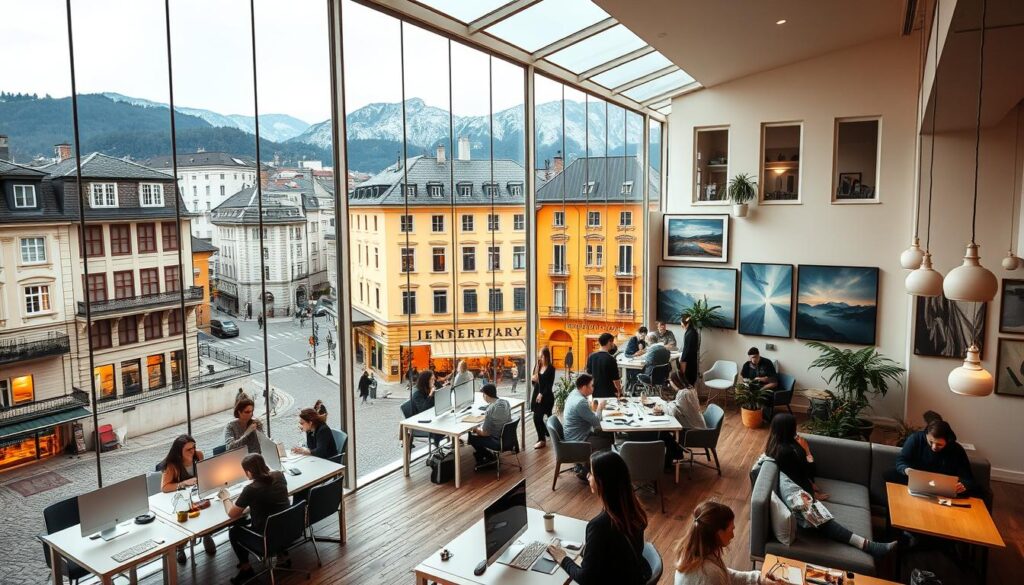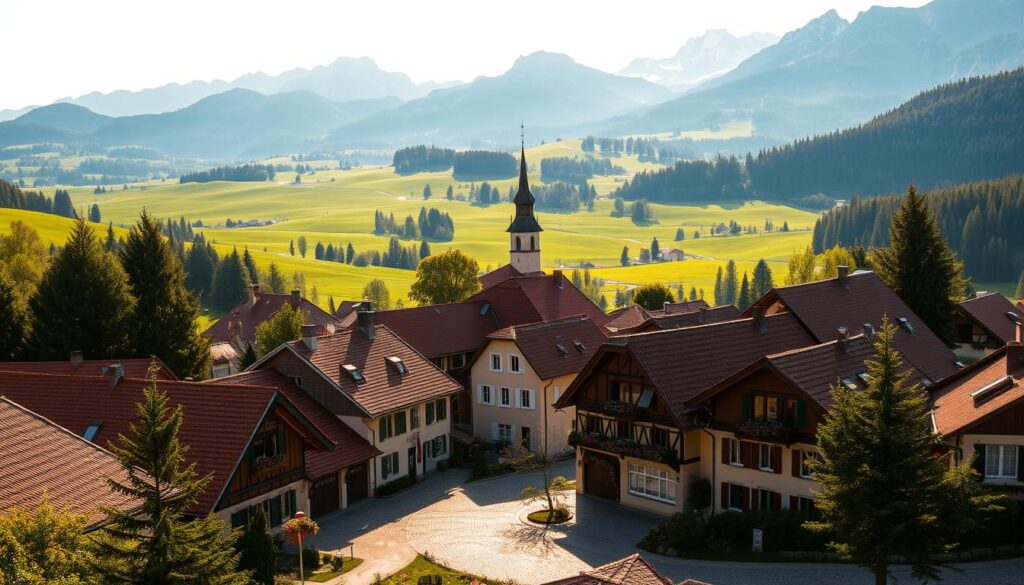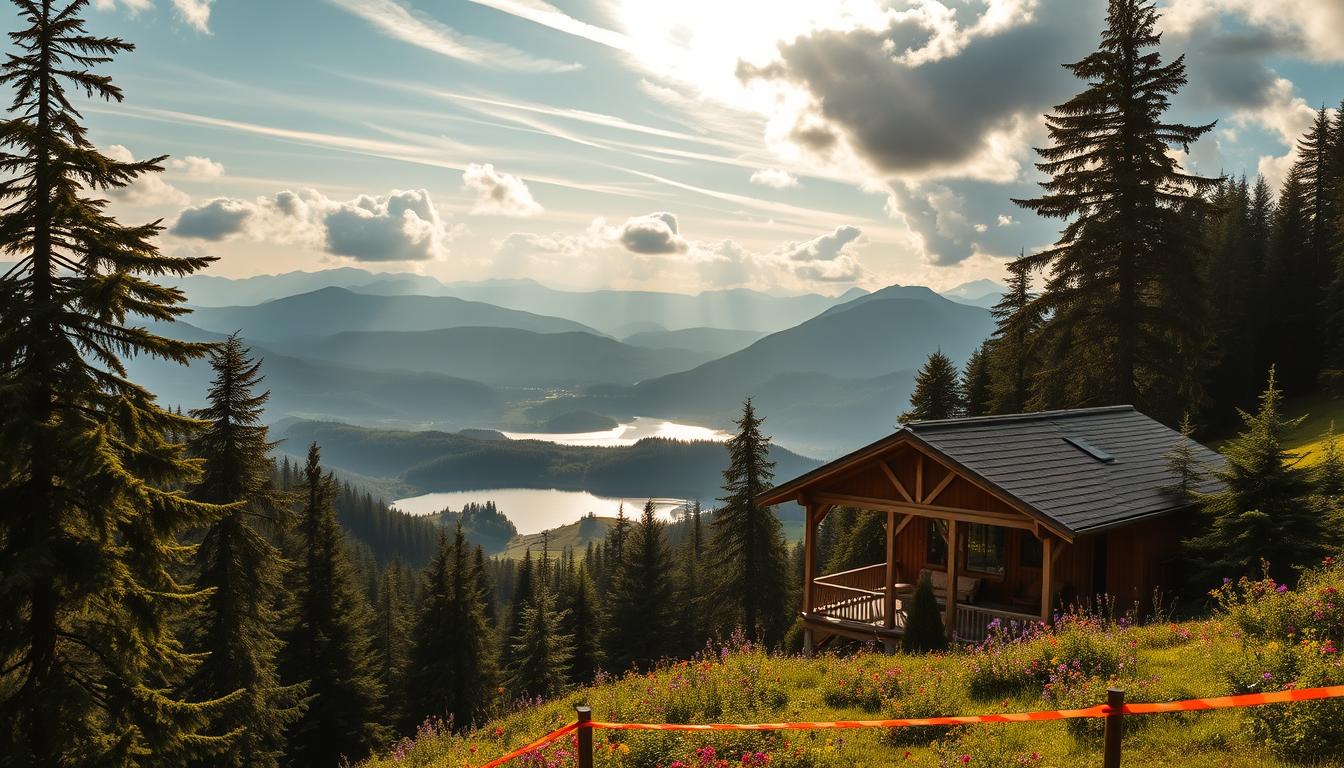Are you looking for the best places to live in Austria as a remote worker?
Austria is a great choice, blending historic charm with modern digital nomad tools. Cities like Vienna and Salzburg have fast Wi-Fi, coworking spaces, and affordable homes.
Whether you’re a remote worker in Austria or a digital nomad enthusiast, this guide is for you. It covers top Austrian cities for remote work, from budget-friendly towns to lively cultural spots. You’ll learn about visa options, cost comparisons, and how to enjoy Austria while working remotely.
Explore cozy Alpine villages or bustling cafes. Use Booking.com to book your stay and GetYourGuide for weekend trips to Mozart’s birthplace or medieval castles.
Contents
- 1 Why Austria is Becoming a Remote Work Haven
- 2 What You Need to Know Before Relocating to Austria
- 3 Vienna: The Urban Remote Worker’s Paradise
- 4 Salzburg: Blend Historical Charm with Modern Work Capabilities
- 5 Innsbruck: Remote Work with Alpine Views
- 6 Best Places to Live in Austria as a Remote Worker on a Budget
- 7 Graz: The Student City with Remote Work Potential
- 8 Rural Austria: Embracing Remote Work in Idyllic Villages
- 9 Health Insurance and Administrative Considerations for Remote Workers
- 10 Building Community: Social Life as a Remote Worker in Austria
- 11 Conclusion: Making Your Austrian Remote Work Dream a Reality
Key Takeaways
- Vienna and Salzburg rank high for digital nomad Austria opportunities with strong internet speeds.
- Austrian cities for remote work like Linz balance affordability with tech infrastructure.
- Healthcare and visa pathways for Americans are covered in detail later in this guide.
- Living in Austria offers access to scenic mountains and European travel hubs.
- Cost-effective housing options exist outside major cities for budget-conscious remote workers.
Why Austria is Becoming a Remote Work Haven
Austria is a top pick for digital nomads with its remote work in Austria options and stunning landscapes. The country’s digital infrastructure Austria is getting better, offering fast internet and beautiful views. This mix of modern tech and outdoor peace is unique.
The Perfect Blend of Nature and Digital Infrastructure
Austria has everything from tech hubs in Vienna to peaceful mountain villages. Its digital infrastructure Austria supports remote work well. Key features include:
- 98% of regions with 100Mbps+ broadband
- Free Wi-Fi in 80% of public libraries and cafes
- Government-funded tech grants for rural internet expansion
Quality of Life Benefits for Digital Nomads
Austria is known for its high quality of life Austria. Here’s how it compares:
| Category | Austria | United States |
|---|---|---|
| Healthcare | Ranked #8 globally | #37 |
| Work-Life Balance | 42-hour weekly average (EU average 39) | 47-hour average |
| Public Transport | 96% on-time trains | N/A |
Workers enjoy a strong work-life balance Austria culture, with 25+ paid vacation days.
Rent starts at $600/month in smaller towns.
Austria’s Central European Advantage
Austria’s location is perfect for exploring Europe. It’s close to 8 neighboring countries. Trains go to:
- Zurich (2h 15m)
- Prague (5h by rail)
- Munich (1.5h)
Book scenic day trips via GetYourGuide for Alpine hikes or city tours. This central European location offers adventure and productivity.
What You Need to Know Before Relocating to Austria
Relocating to Austria needs careful planning. First, learn about Austria visa for Americans rules. US citizens must get a National Visa (D) for stays over 90 days. This visa is processed at Austrian embassies.
Austria also requires proof of health insurance and enough money for living costs.
The cost of living in Austria varies by region. Vienna’s prices are like those in Denver or Seattle. But, smaller towns are more affordable.
Use Booking.com to find short-term rentals and explore cities. Remember, Austria taxes global income. So, talk to a local advisor about taxes.
Language barriers in Austria depend on where you are. Vienna and tech hubs like Linz often use English. But, rural areas need basic German.
A quote from expats: “Learning 100 common phrases made daily life easier.”
Setting up a bank account starts with opening a local one. Most banks like Raiffeisen or Erste Bank let you apply online. Look for affordable housing outside big cities.
Salzburg or Graz have 30% lower rent than Vienna. Use GetYourGuide for cultural tours to see if a city fits before you move.
Plan a 2–3 week trial stay to test regions. Check if Austria and the US have tax agreements to avoid double taxation. Start with temporary stays using Booking.com to plan your move.
Vienna: The Urban Remote Worker’s Paradise
Vienna is a lively city with top-notch amenities for remote workers. Look for Vienna coworking spaces like Impact Hub Vienna. They offer fast internet up to 1 Gbps. The Office Vienna also has 24/7 access, perfect for your work needs.
Coworking Spaces and Digital Infrastructure
Here are some of the best Vienna coworking spaces:
- Impact Hub Vienna: Offers monthly memberships from €250, with event spaces and green initiatives.
- Beurmitte: Located downtown, it has unlimited coffee and fast Vienna internet speed (up to 1 Gbps).
Cultural Benefits for Long-term Residents
Annual museum passes give you access to over 80 museums. GetYourGuide offers discounts to the Spanish Riding School. Living in Vienna as a remote worker means enjoying concerts at the Musikverein or street art in Mariahilf.
Accommodation Options in Vienna
Booking.com offers short-term stays for €80-€120/night in central areas. Long-term rentals in Margareten start at €900/month. This fits the cost of living Vienna budget.
Top City Districts for Remote Workers
Consider these Vienna districts for expats:
- Favoriten: Affordable housing, tech events, and the Prater park.
- Margareten: Cozy cafés, near public transport, and a growing expat community.
“Rent in the 10th district is 20% lower than central zones, but still close to everything I need.” – Sarah, UX designer
Vienna offers a great mix of work and culture. Explore Margareten to find the perfect balance of work, culture, and community.
Salzburg: Blend Historical Charm with Modern Work Capabilities
Salzburg’s streets are lined with cobblestones and baroque buildings. It’s a perfect place for Salzburg digital nomads. Here, work and play go hand in hand.

Fast internet and Salzburg coworking spaces make working remotely easy. Cafes and hubs like Salzburg Digital Hub and MozartWorks have great Wi-Fi. Download speeds are fast, even faster than in some US cities.
Public Wi-Fi is everywhere, especially in Altstadt. It’s free and reliable.
- Internet: Consistent speeds, ideal for video calls and cloud work
- Coworking spaces: Monthly memberships from €150, including event access
Salzburg is cheaper than Vienna. A one-bedroom apartment costs €800–€1,000 a month. Utilities add €150. Food and dining are also more affordable than in US coastal cities.
Booking.com is great for finding short-term stays. It helps you find long-term rentals too.
“Salzburg’s mountains and Mozart trails make every workday break feel like an adventure.”
Weekends are full of activities. You can hike the Untersberg volcano or kayak on Lake Wolfgangsee. GetYourGuide tours show you the living in Salzburg soundtrack’s real locations.
Day trips to Berchtesgaden or Hallstatt are just under two hours away. They add excitement to your weekends.
Salzburg is perfect for Salzburg digital nomads. It offers a great mix of history and modern tech.
Innsbruck: Remote Work with Alpine Views
Imagine typing emails while looking at the Nordkette mountains. Innsbruck mixes Innsbruck remote work with beautiful views. It has a strong Innsbruck digital infrastructure for easy internet access.
With 95% of the city having fiber-optic internet, working here is smooth. Places like AlpenSpace offer fast internet. For Innsbruck for digital nomads, 40% of locals speak English, making it easy to connect.
| Category | Innsbruck | Vienna | Salzburg |
|---|---|---|---|
| Monthly Rent (1-bedroom) | €900-1,200 | €1,200-1,600 | €800-1,100 |
| Internet (50 Mbps) | €25/month | €30/month | €28/month |
Innsbruck’s cost of living is low, so you can ski and hike all day. Rent an apartment for under €1,000/month on Booking.com.
Cafés like Bergisel Coffee have Wi-Fi and views, great for calls. Many remote workers start with a hike before work.
- 30 coworking spaces citywide
- Year-round outdoor activities (skiing, climbing)
- Public transport connects to nearby towns in 20 minutes
Living in Innsbruck boosts productivity, say many. “I work three days a week, then explore the Patscherkofel mountain,” says a remote marketer.
Book day trips via GetYourGuide to Tyrolean villages or Neustift Valley. With reliable tech and outdoor fun, Innsbruck is perfect for digital nomads.
Best Places to Live in Austria as a Remote Worker on a Budget
Looking for affordable places to live in Austria without giving up quality? Don’t just look at Vienna and Salzburg. Many cheap Austrian cities have affordable remote work Austria options while keeping costs down.
Affordable Housing Outside Major Cities
Places like Linz and Klagenfurt have studios for €500/month or less. Smaller towns like Steyr or Wels offer cozy apartments starting at €400. Check out Booking.com for budget-friendly options in these areas.
Cost Comparison Austria by Region
Let’s compare living costs across Austria:
- Housing: Rural areas: €400–600/month vs. Vienna: €1,000+
- Food: €300–400/month nationwide
- Transport: Regional trains: €25/month pass vs. city taxis: €3–5/ride
Average monthly budget for a single remote worker in rural Austria: €800–1,000
Getting More Bang for Your Buck
Here’s how to save more:
- Apply for student discounts at local cafes and events
- Use seasonal passes for public transport
- Join coworking spaces for tax deductions
Smaller towns offer great deals on living. Budget living Austria here means bigger spaces and a slower pace without losing out on connectivity.
Graz: The Student City with Remote Work Potential
Graz is a hidden gem for remote workers, mixing student life with modern tech. It’s cheaper than Vienna but still has great connectivity. It’s perfect for those who want innovation and affordability. Graz offers quiet spots and a lively cultural scene.
“Graz’s tech scene thrives on collaboration between startups and the university ecosystem.”
Tech Community and Networking Opportunities
Graz’s tech scene is all about innovation, thanks to places like Steirische Produktions AG. Events like the Tech Innovation Summit also play a big role. Remote workers can meet at Graz Digital Hub to talk about AI and green tech.
Networking nights at Spark Coworking are great for freelancers and startups to connect.
- Key spaces: The Cube, Steirischer Zukunftsraum
- Monthly events: Coding workshops, startup pitch nights
Living Arrangements in Austria’s Second City
Rent in Graz is 30% cheaper than in Vienna. Popular spots include:
| Neighborhood | Rent (1 bedroom/month) | Commute to Tech District |
|---|---|---|
| Murinsel | €650-€800 | 10-minute bike ride |
| Innere Stadt | €700-€900 | 5-minute walk |
For short stays, Booking.com is a good option. Herrengasse is close to Hub Graz, making it a top pick. Utilities cost about €120/month, keeping living costs low.
Rural Austria: Embracing Remote Work in Idyllic Villages
Rural Austria living is a peaceful escape. The Austrian countryside meets modern remote work needs. Village life in Austria offers peace and space, but it has its challenges.
Getting reliable internet in rural Austria and daily needs can be tough. But, many small towns now have good Wi-Fi. Places like Bregenzerwald and Salzkammergut are leading the way. Still, it’s important to find out about local Wi-Fi hotspots.

Living in remote work small towns in Austria means being flexible. Most villages don’t have public transport, so having a car is helpful. You can find affordable housing, from farmhouses to cozy cottages. Use Booking.com to try out places before you decide.
- Pros: Lower costs, scenic beauty, and tight-knit communities
- Cons: Limited amenities and seasonal weather challenges
Many locals welcome remote workers with programs like the Bundesprogramm Digitale Zukunft. This improves broadband access. You can get to know neighbors at farmers’ markets or cultural festivals. Weekend trips, like hiking or lake tours, can be booked on GetYourGuide.
Rural Austria is perfect for those who want space and simplicity. It’s a mix of tradition and modernity. The Austrian countryside offers a unique work-life balance for those ready to embrace it.
Health Insurance and Administrative Considerations for Remote Workers
Working remotely in Austria means you need to understand health insurance and legal rules. Here are the key steps to follow and stay safe.
Visa Options for American Digital Nomads
Americans wanting to work remotely in Austria have to pick the rightAmerican visa Austria. TheAustria digital nomad visa, launched in 2023, lets you stay up to 6 months with income proof. You can also look into self-employment visas or EU D visas for longer stays. Each visa has its own rules:
- Proof of health insurance (required within 3 months of arrival)
- Financial stability documents
- Travel medical insurance for stays under 90 days
Setting Up as a Freelancer or Remote Employee
Freelancers need to register with Austria’sGewerbeanmeldungwithin 30 days. This involves:
- Joining the local chamber of commerce
- Paying social security contributions (about 20-30% of income)
- Taxes for remote workers in Austria range from 25-55% based on income
If you work remotely for a U.S. company, you’ll need to file taxes in both countries. Use the U.S.-Austria tax treaty to avoid paying twice.
Banking and Tax Implications
Opening a bank account in Austria usually needs proof of residency and ID. Digital banks like bnext or revolut make international transfers easier. Freelancers in Austria should keep track of VAT (20% standard rate) and make quarterly tax payments.
It’s crucial to getAustria health insurance for expatsfrom providers like Allianz or BVA. Without insurance, you might face fines or visa issues.
Don’t forget to talk to local legal experts for setting up businesses or tax filings. Austria values planning ahead, so your remote work journey is off to a good start.
Building Community: Social Life as a Remote Worker in Austria
Working remotely in Austria means enjoying beautiful views and flexibility. But, it takes effort to build a social life. Join local groups to connect with others. Use platforms like InterNations or Facebook’s “Vienna Expat Group” to meet remote workers and locals.
Networking isn’t just for work. Explore Meetup.com for hiking, cooking, or board games. German classes can help you meet locals and learn the language. Even simple German phrases can help you connect.
- Join city-specific expat meetups (e.g., Salzburg’s English-Speaking Community)
- Attend coding workshops or startup nights in tech hubs like Linz
- Volunteer at local festivals like Vienna’s Ball Season or Innsbruck’s Christmas markets
Breaking isolation starts with small steps. Try group tours in Salzburg or Graz. These activities can lead to new friendships.
Winter can be cold, but there are cozy spots to warm up. Vienna’s Prater has ice-skating parties. These are great places to meet people.
“Joining a monthly trivia night at a Vienna café helped me bond with Austrians and other expats—it’s where I found my first hiking buddy!”
Building a social network takes time, but Austria is welcoming. Mix work networking with casual hangouts for a fulfilling social life.
Conclusion: Making Your Austrian Remote Work Dream a Reality
Austria is a perfect mix of beauty and modern life, great for remote work. You can choose from busy cities like Vienna or peaceful countryside. Start by looking into visa options and steps to move to Austria on official sites.
Use Booking.com to check out neighborhoods before you move. GetYourGuide can help you book tours to learn about local culture. This way, you can find the best place for you.
Plan well in advance. You’ll need 6–12 months to find a place to live, understand preparing for Austria relocation details, and learn some German. Budget for initial costs like deposits and paperwork. But, remember, smaller towns are often cheaper than big cities.
Join expat groups or coworking spaces when you arrive. This will help you meet new people. Also, start early on visa requirements—Section 10 has info for Americans. Explore Austria’s mix of old charm and modern tech, like Innsbruck’s mountains or Salzburg’s culture.
Start your journey in Austria’s welcoming environment. Check out this guide’s sections on housing, health insurance, and regional highlights. Whether you’re a digital nomad or planning to stay long-term, Austria’s diverse areas offer flexibility. Begin your Austria remote work planning today—your next chapter is waiting.


